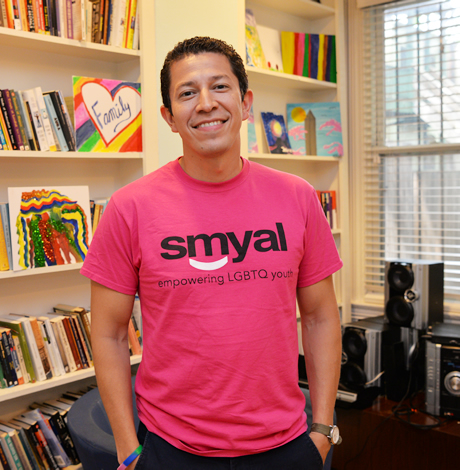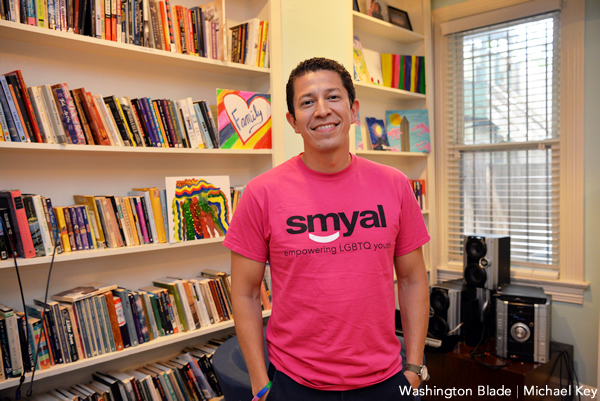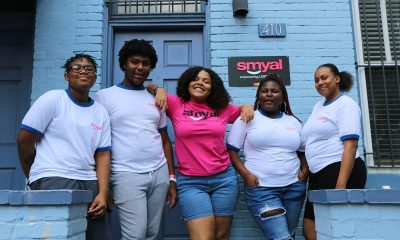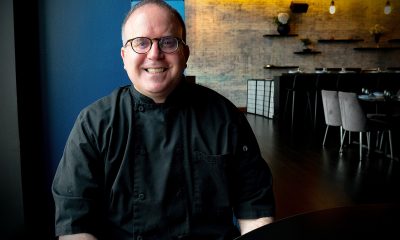Arts & Entertainment
SPOTLIGHTING LGBT HOMELESSNESS: SMYAL’s 18-month shelter program houses LGBT youth
Housing hub inspired by alarming 2015 D.C. study

This story is part of our contribution to the 2018 #DCHomelessCrisis news blitz. Local media outlets will be reporting and discussing stories about ending homelessness in the nation’s capital all day. The collaborative body of work is cataloged at dchomelesscrisis.press.
Chris Lewis aspires to be a beauty influencer on YouTube with millions of subscribers. Although there are few beauty gurus who are men of color, Lewis is ready to pioneer a beauty movement with SMYAL’s transitional housing program serving as a stepping stone for his goals.
The 25-year-old was born in Queens, N.Y., and later raised in the D.C. area. Lewis, who identifies as gay, says he was facing “extreme homelessness to the point where I was sleeping out on the street and in parks and sometimes from couch to couch.”
Lewis found housing with the Wanda Alston Foundation, D.C.’s first transitional house for homeless LGBT youth which opened in 2008. After graduating from the program, Lewis moved into SMYAL’s transitional house in November.
SMYAL’s transitional housing program opened in January 2017 in response to D.C.’s 2015 Homeless Youth Census, which states that 43 percent of homeless youth identify as LGBT.
The facility can accommodate 12 residents at a time for SMYAL’s 18-month program. Since its opening, 13 residents have been housed.
Residents are referred to the program through social workers, doctors, therapists, school personnel or through another agency. Once referred, potential residents come in for interviews and assessments. If the resident is accepted, they receive a welcome kit with toiletries, sheets and towels. Transportation is paid for and Safeway gift cards are distributed for residents to buy their own groceries and cook their own meals.
Director of Youth Housing Jorge Membreño, a program assistant, a case manager or another member of staff is on site anytime between 8 a.m.-6 p.m. The program offers case management for the development of a personal action plan and weekly check-in meetings. Supportive services are offered including medical care, mental health services and self-care support. Residents also learn skills pertaining to job hunting, apartment hunting, finding programs to get food stamps and more. There are also community outings and LGBT youth networking opportunities.
Membreño says there hasn’t been any major behavioral issues so far in the program.
After residents leave the program staff follows up with them for one year through text, email or a phone call at least once a week.
The annual operating budget is funded completely by the D.C. Department of Human Services.
The program is designed for LGBT residents but Membreño says the program doesn’t screen potential residents based on their sexuality. He trusts that LGBT residents looking for a safe place to express themselves will be drawn to the program because they can safely be themselves. Membreño says many of their residents have recounted stories of staying at shelters and having to hide their gender expression or sexuality to be safe.
According to Membreño, LGBT homeless numbers are similar in D.C. compared to other major cities such as New York City and Chicago. However, Membreño thinks the factors for LGBT homelessness are not widely known to the public.
“The one you hear the most is when a family ostracized someone,” Membreño says. “Something we don’t talk about a lot is parental incarceration, low parental involvement, family homelessness. There are different factors that contribute to LGBT homelessness other than just the ostracization.”
Membreño identifies as straight but LGBT homelessness is close to his heart. He started his career as a social worker for the LGBT community and eventually found himself working in homelessness as a school social worker. He also is a licensed therapist and decided to incorporate the world of therapy and social work together.
“The more and more I got involved with it and the more I worked with LGBTQ-identifying youth I decided to merge the two into two passions I loved working with and then being able to focus my attention within the city to make sure that our youth had access to equitable housing and that D.C. was really paying attention,” Membreño says.
Lewis is also realizing his dreams through SMYAL’s transitional housing program. He cites YouTubers Jackie Aina, Jeffree Star and Manny MUA as inspirations for his career. He also credits a friend who died for getting him interested in makeup.
“I want to be in a space where I can create a studio with all my makeup and really reach out to people who are like me, men of color, who want to become a beauty influencer and create a brand that is all-inclusive for everybody,” Lewis says.
In a place like SMYAL’s traditional housing program Lewis’ goals are encouraged in a way that may not be as accepted in a non-LGBT program.
“Having a place where you can identify with the people you’re with also helps create a level of safety, family and community that you might not find in other residential or transitional living centers,” Membreño says.
For more information on SMYAL’s transitional housing program, visit smyal.org.
a&e features
Eastern Shore chef named James Beard Finalist
Harley Peet creates inventive food in an inclusive space

In a small Eastern Shore town filled with boutiques, galleries, and the occasional cry of waterfowl from the Chesapeake, Chef Harley Peet is most at home. In his Viennese-inflected, Maryland-sourced fine-dining destination Bas Rouge, Peet draws from his Northern Michigan upbringing, Culinary Institute of America education, and identity as a gay man, for inspiration.
And recently, Peet was named a James Beard Finalist for Best Chef: Mid-Atlantic – the first “Best Chef: Mid-Atlantic” finalist representing the Eastern Shore.
Peet, after graduation from the Culinary Institute of America, took a position as sous chef at Tilghman Island Inn, not far from Bas Rouge. Falling in love with the Eastern Shore, he continued his passion for racing sailboats, boating, gardening, and fishing, and living his somewhat pastoral life as he opened Bas Rouge in 2016 as head chef, a restaurant part of the Bluepoint Hospitality group, which runs more than a dozen concepts in and around Easton, Md.
Coming from a rural area and being gay, Peet knew he had his work cut out for him. He was always aware that the service and hospitality industry “can be down and dirty and rough.”
Now as a leader in the kitchen, he aims to “set a good example, and treat people how I want to be treated. I also want to make sure if you’re at our establishment, I’m the first to stand up and say something.”
The Bas Rouge cuisine, he says, is Contemporary European. “I’m inspired by old-world techniques of countries like Austria, Germany, and France, but I love putting a new spin on classic dishes and finding innovative ways to incorporate the bounty of local Chesapeake ingredients.”
His proudest dish: the humble-yet-elevated Wiener Schnitzel. “It is authentic to what one would expect to find in Vienna, down to the Lingonberries.” From his in-house bakery, Peet dries and grinds the housemade Kaiser-Semmel bread to use as the breadcrumbs.
Peet works to support the LGBTQ community inside and outside of the kitchen. “I love that our Bluepoint Hospitality team has created welcoming spaces where our patrons feel comfortable dining at each of our establishments. Our staff have a genuine respect for one another and work together free of judgment.”
Representing Bluepoint, Peet has participated in events like Chefs for Equality with the Human Rights Campaign, advocating for LGBTQ rights.
At Bas Rouge, Peet brings together his passion for inclusion steeped in a sustainability ethic. He sees environmental stewardship as a way of life. Peet and his husband have lived and worked on their own organic farm for several years. Through research in Europe, he learned about international marine sourcing. Witnessing the impacts of overfishing, Peet considers his own role in promoting eco-friendly practices at Bas Rouge. To that end, he ensures responsible sourcing commitments through his purveyors, relationships that have helped create significant change in how people dine in Easton.
“I have built great relationships in the community and there’s nothing better than one of our long-standing purveyors stopping in with a cooler of fresh fish from the Chesapeake Bay. This goes especially for catching and plating the invasive blue catfish species, which helps control the species’ threat to the local ecosystem.
Through his kitchen exploits, Peet expressed a unique connection to another gay icon in a rural fine-dining restaurant: Patrick O’Connell, of three Michelin starred Inn at Little Washington. In fact, Peet’s husband helped design some of O’Connell’s kitchen spaces. They’ve both been able to navigate treacherous restaurant-industry waters, and have come out triumphant and celebrated. Of O’Connell, Peet says that he “sees [his restaurants] as canvas, all artistry, he sees this as every night is a show.” But at the same time, his “judgment-free space makes him a role model.”
Being in Easton itself is not without challenges. Sourcing is a challenge, having to either fly or ship in ingredients, whereas urban restaurants have the benefit of trucking, he says. The small town “is romantic and charming,” but logistics are difficult – one of the reasons that Peet ensures his team is diverse, building in different viewpoints, and also “making things a hell of a lot more fun.”
Reflecting on challenges and finding (and creating) space on the Eastern Shore, Peet confirmed how important it was to surround himself with people who set a good example, and “if you don’t like the way something is going, fuck them and move on.”

Team DC, the umbrella organization for LGBTQ-friendly sports teams and leagues in the D.C. area, held its annual Night of Champions Awards Gala on Saturday, April 20 at the Hilton National Mall. The organization gave out scholarships to area LGBTQ student athletes as well as awards to the Different Drummers, Kelly Laczko of Duplex Diner, Stacy Smith of the Edmund Burke School, Bryan Frank of Triout, JC Adams of DCG Basketball and the DC Gay Flag Football League.
(Washington Blade photos by Michael Key)




















The 2024 National Cannabis Festival was held at the Fields at RFK Stadium on April 19-20.
(Washington Blade photos by Michael Key)
















Covering the @NatlCannaFest at RFK Stadium for @WashBlade . Stop by the LGBTQ+ booth and pick up a paper if you are here. pic.twitter.com/is7hnsaPns
— Michael Patrick Key (@MichaelKeyWB) April 20, 2024





















